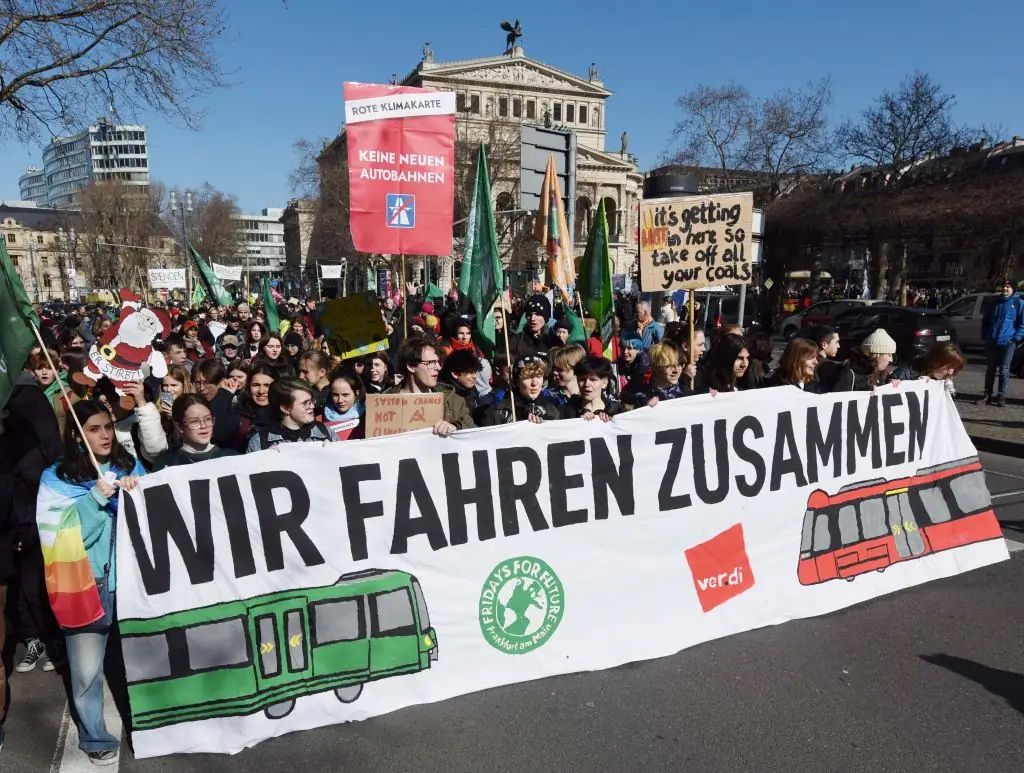Philip Chmel is a member of Sozialistische LinksPartei (ISA in Austria).
On 19 April, tens of thousands of young and oppressed as well as working class people more broadly will once again hit the streets for the next global climate strike with actions expected on all continents. The slogans of this climate strike “#ClimateJusticeNow” and “Fight with us for a world worth living in” reflect a growing understanding that collective struggle is crucial to win a good life for all and that this will only be possible with strong solidarity leaving no one behind.
This climate strike happens in the midst of the ongoing genocidal onslaught in Gaza, brutal wars and conflicts, including in Congo, Yemen, Sudan and Ukraine and against the backdrop of the ever-escalating climate crisis. The past 12 months ranked as the planet’s hottest ever recorded, reaching an average of 1.58°C over pre-industrial levels. This is just one of the many climate records that was broken over the last year and is a terrifying harbinger of what is to come if we don’t build a movement strong enough to enforce the necessary change. None of the shades of the capitalist ruling classes – whether “liberal” or right wing – have anything to offer for the majority of the global population except a plethora of crises – economic, ecological, political, social and more.
A combative, international climate movement of youth, workers, farmers, Indigenous, poor and oppressed people – overcoming through struggle and solidarity the divisions pushed upon us by the ruling class to uphold their broken system – is urgently needed to lay crucial steps to overthrow this deadly capitalist system and replace it with an egalitarian and democratic socialist system.
An international economy in which key sectors are publicly owned and democratically planned by the working class, would rationally plan their use according to the needs of people and the planet. This would allow us to effectively curb global heating while also guaranteeing workers’ rights, and protecting and increasing the living standards of the vast majority of humankind while eliminating the excesses of the super rich.
Widening metabolic rift causes misery and mayhem
The escalating climate and ecological crisis is insurmountable under capitalism as it is a product of the system’s fundamental contradictions, a system built on the private ownership of the means of production, whose core imperative is the accumulation of private profit. Capitalism is rooted in the exploitation of human labor and expropriation (robbery) of nature and will always put the wealth of a tiny minority before the needs of people and the planet; it thereby undermines “the original sources of all wealth –- the soil and the worker” as summarized by Marx. He describes this in his theory of the metabolic rift. Ruptures in the material exchange (e.g. resources, waste and greenhouse gas emissions) between nature and society –- the social metabolism –- did not arise under capitalist relations of production, but were and are intensified and accelerated by them, and cannot be overcome under capitalism.
Over the last decades, the metabolic rift has become so wide that the destructive impacts of the climate and environmental crises on people’s lives have become the new normal. ‘The State of the Global Climate 2023’ report recently published by the World Meteorological Organization’s (WMO) states “that records were once again broken, and in some cases smashed, for greenhouse gas levels, surface temperatures, ocean heat and acidification, sea level rise, Antarctic sea ice cover and glacier retreat. Heatwaves, floods, droughts, wildfires, and rapidly intensifying tropical cyclones caused misery and mayhem, upending everyday life for millions and inflicting many billions of dollars in economic losses.” Extreme heat is among the most dangerous effects. In 2022, “an estimated 62,000 lives were lost in Europe alone due to extreme heat”. “Heat stress is projected to reduce total working hours worldwide by 2.2 per cent and global GDP by US$2,400 billion in 2030”, according to the ILO.
Whether little or no climate protection, the working class still pays the bill
There are divisions among the ruling classes on how to “manage” the climate crisis, to a degree reflecting the battle between different capital sectors as well as political parties appealing to different voter groups. Some more “farsighted” parts push for limited climate measures and policies that favor for example electrification and expanding renewable energy, often as part of public investments into strategic sectors – like Biden’s Inflation Redaction Act or the European Green Deal presented in December 2019. These measures have also been an attempted ideological “answer” by the ruling class to the 2019 global mass climate movement, which politicized hundreds of thousands of working class and especially young people, to try to limit the disillusionment with the capitalist system.
Despite some limited measures, however, emissions are on the rise and planned fossil fuel extraction up to 2030 is more than double than what would be consistent with limiting global warming to 1.5°C. This shows yet again that effective climate protection is not possible under capitalism, whose internal contradictions have caused a renewed fossil upsurge turbocharged by Russia’s invasion of Ukraine. Linked with this, oil and gas profits have actually tripled under Biden compared to the first three years under Trump, whose plans to scrap the IRA could add an extra 4 billion tonnes of carbon dioxide equivalent (GtCO2e) by 2030, “the equivalent to the combined annual emissions of the EU and Japan, or the combined annual total of the world’s 140 lowest-emitting countries”.
In Europe, the picture is similar. The Green party in Germany has supported the RWE mine expansion in Lützerath in 2023 and the building of Liquid Natural Gas terminals, and EU climate measures are increasingly questioned and attacked, especially from the right and far-right. Moreover, in September 2023, British Prime Minister Rishi Sunak announced that rules against internal combustion engine cars and the rollout of clean heat for British homes will be pushed back by five years to 2035. In February 2024, 70 CEOs from 20 energy-intensive sectors unveiled the so-called ‘Antwerp Declaration’ “a plan for a European Industrial Deal designed to counter the European Green Deal”. This is an attempt to boost competitiveness of European industry vis-a-vis China and the US and to slow down and counter deindustrialization, which has been the key reason for the 8% drop in emissions (2023 compared to 2022) in the EU.
Where the ruling class is very much in agreement, however, is on the question of who should pay the bill. While billions are handed out to companies for “strategic investments”, pumped into the fossil fuel industry via subsidies (the IMF estimated them at $7 trillion or 7.1% of GDP globally in 2022) and spent on militarization, the working class is facing brutal austerity measures and small farmers and peasants are forced to accept prices for their produce from which they cannot live.
To show the scale of the inequality:
- 80% of global “carbon dioxide emissions since 2016 can be traced to a group of 57 fossil fuel and cement producers” (nation-states, state-owned firms and investor-owned companies)
- The richest 1% emit more carbon emissions than the poorest 66%
- There are more billionaires, and they are richer than ever before as recently shown by Forbes. Oxfam found that “since 2020, five billion people have become poorer, while the world’s five richest men have more than doubled their fortunes—at a rate of $14 million per hour.”
The anger over extreme inequality has also been at the heart of the ongoing farmers protests across Europe, which were triggered by discussions on cutting diesel subsidies to farmers. A recent article showed that “80% of the EU farming budget goes to roughly 20% of farmers – the biggest and richest” and that the Common Agriculture Policy (CAP), which is presented as a protection for farmers, is actually a key driver behind the decline of small farms. From 2005 to 2020, farms in the EU decreased by nearly 40%, pushing around 5.3 million farmers, mainly from small farms (<5 hectares), out of business. While agribusiness has so far successfully misused the legitimate anger of small farmers and peasants to boost their own profits, as the EU decided to take “the ax to green farming rules” to quell the protests, this does not correspond in any way with the needs of the majority of farmers. Farmers are primarily demanding higher and minimum prices for their produce. A recent study showed that 62% of French farmers actually believe that the ecological transition is a necessity, with 23% even seeing it as an opportunity and only 15% rejecting the ecological transition.
The far-right has also tried to exploit the farmers’ movement and inequality generally, especially with EU elections coming up, by putting up a social facade and attacking climate politics, hypocritically leaning on the measures’ anti-social character. The broader pushback against climate policies has been dubbed “greenlash,” pointing to the parallel with the right-wing backlash against women, LGBTQIA+ and migrant rights in the context of growing polarization, and has been accompanied by significant uptick in state repression.
People Want Action on Climate
Notwithstanding these developments, the climate crisis continues to be a strong concern for the vast majority of the working class internationally. An Ipsos poll surveying over 24,000 people across 31 countries in October 2023 found that “seven in ten people anticipate climate change will have a severe effect in their area within the next ten years” and 71% see through corporate greenwashing tactics, saying businesses “use environmental claims without committing to real change”. Similarly, a study recently published in Nature that surveyed almost 130,000 people across 125 countries found that “89% demand intensified political action” to tackle climate change.
Moreover, while the global climate demonstrations have decreased in size since 2019, it is clear by now that the climate movement generally is here to stay, testament to the deadly threat the climate crisis poses to the majority of humanity. Since 2019, climate groups have been searching and testing out different methods and strategies. Two important trends can be identified: mass direct action against fossil infrastructure and “convergence of struggles” with climate groups taking clear stances and joining demonstrations against oppression –- most strikingly in solidarity with Gaza and Palestine, as expressed in Greta Thunberg’s statement “no climate justice on occupied land,” as well as orienting stronger to the trade union and workers’ movement.
Over the last years, groups similar to Ende Gelände, which started 2015 in Germany, have also formed in many other countries, for example Code Red in Belgium or Les Soulèvements de la Terre (The Earth Uprisings Collective) in France. The groups fight for system change, with some explicitly anti-capitalist and anti-imperialist ideas, and use mass direct action against fossil infrastructure. In their programs, the groups combine climate and social demands. The demands include scrapping of fossil subsidies, a just transition and well-paid green jobs for workers, affordable public transport and energy, as well as public democratic ownership of the energy sector. The combination of climate and social demands is crucial: a European Investment Bank survey from November 2023 (30,000 people were interviewed across 35 European countries) showed that people’s main worries were the rising cost of living (68%) and climate change (45%).
The most impressive movement against environmentally destructive industry has been seen in Panama. In the largest protest movement in decades, Indigenous people, youth, trade unions and the wider working class started a struggle against a Canadian-owned copper mine in October 2023. After weeks of road blockades, strikes and protests in at least 10 cities, the country’s Supreme Court ruled in November that Panama’s new mining contract with the Canadian company First Quantum was unconstitutional.
Climate and Workers Solidarity
While still on an initial level, it is extremely significant that climate groups in several countries have strengthened links with the trade union and workers movement, reflected in demands, but also concrete actions and campaigns.
In Germany, Fridays for Future and the trade union ver.di have joined forces for the campaign #wirfahrenzusammen (“we ride together”). They demand massive investment in public transport to double its capacity by 2030 and higher wages and better working conditions for workers in the sector. Already in March 2023, public transport workers and climate activists went on strike together for those demands in over 40 cities, and in March this year they organized “a week of strike action culminating in a collective nationwide walkout and climate protest on March 1” that saw protests in all German states except Bavaria, involving 90,000 workers. A similar campaign has recently been initiated in Austria, where parts of the climate movement have linked up with bus drivers and the union vida for better working conditions.
In the US, environmental groups joined striking UAW auto workers on the picket lines in autumn 2023, highlighting the need for a just transition and the Sunrise Movement puts forward the demand for green union jobs.
In Switzerland, the group “Climate Strike Switzerland” takes a clear stance against green capitalism and calls for system change as a requirement to stop the exploitation of people and nature. They make clear that “private property makes it impossible to reach climate justice”; calls for the expropriation of German energy corporation RWE and for public democratic public ownership of the energy sector, and urged people to join unions and mobilized for the trade union demonstration for higher wages in September 2023 with the slogan: “Up with wages, down with CO2!”. Moreover, they recently announced that they will support the struggle of former GKN (company for automotive parts) workers against job losses and for “the reconversion toward sustainable mobility and renewable energy” by becoming a cooperative member.
Initially, the former GKN workers, who have occupied their factory since July 2021, aimed for nationalization under democratic control, but official trade unions did not join their struggle, which significantly weakened their hand. Feminist and climate groups, however, supported them in various ways including with several large demonstrations of up to 25,000, and it is thus no surprise that the former GKN workers will join the climate march in Florence on April 19. Workers from other automotive supply chain companies in crisis will do the same. In Bologna, Marelli workers will join the protests and in Turin, where a climate and labor march has recently taken place, the climate movement has protested side by side with the former FIAT workers.
These examples are very positive and can serve as inspiration for struggles elsewhere. With the electrification of the automotive sector, we will see more and more job cuts (building electric cars generally requires fewer workers) and attacks on workers in the industry. Similar developments can also be seen in the European steel industry. The answer to such attacks must be a united struggle by workers and social movements against job loss and for production conversion towards sustainable production, mobility and renewable energy with the clear demand for nationalization under democratic workers’ control.
A publicly-owned, planned economy with real democratic control by workers in those industries and society as a whole could create millions of well-paid and sustainable jobs and build a new green economy.
This is the only way to ensure that workers’ rights and past gains are protected, as part of a just transition for working people. Workers in fossil industries could be redeployed with no job losses or pay reductions, moving from environmentally damaging production toward projects that benefit society and the planet. In a democratically planned economy, greed, corruption and competition would be replaced by an economic system that is based on the needs of people. This is also a prerequisite to end wars and conflicts and give a real answer to people who are forced to flee from their homes as a result of the climate crises.
Read our 8 POINT SOCIALIST PROGRAM to see our proposal and demands for what is necessary to effectively fight the climate crisis.



